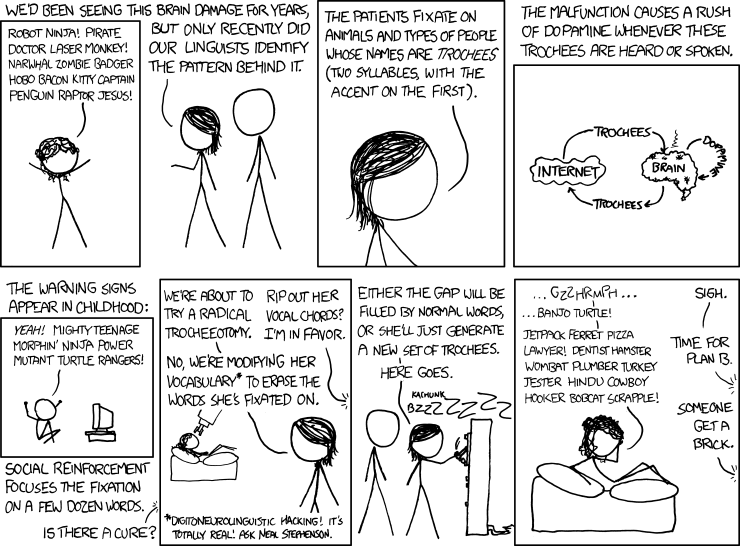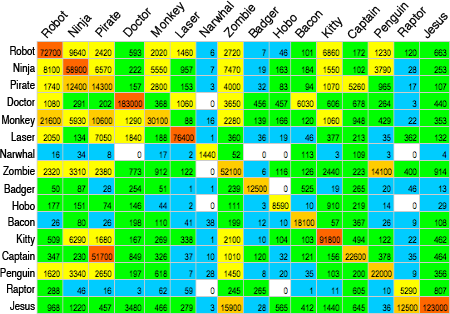The biggest indie game of 2010: Minecraft. Since it shares half a compound noun with the title of this blog, that seems as good an excuse as any to look at the "etymology" of Minecraft.
First, in case you're unfamiliar with Minecraft, here's a video:
In terms of Minecraft's design inspiration, its creator, Markus "Notch" Persson, attributes its origins to Infiniminer, Dungeon Keeper, Left 4 Dead, and Dwarf Fortress (the last has been described as a mixture of Nethack, Oregon Trail, The Sims, and Lemmings).
Etymology 1: "the art of mining"
If Minecraft were truly parallel to stæfcræft, then it would be what is referred to in Sanskrit grammar as a tatpuruṣa (तत्पुरुष) compound , that is, a compound of the form YX, where X is the head noun and Y relates to X as if it were some non-nominative case form, e.g. a genitive, dative, etc. For example, the tatpuruṣa compound mousehunter is a hunter (=X) of mice (=Y). If this were the case then Minecraft would mean something like "the craft of mining", i.e. "the art of mining",---which in fact is an analysis which makes eminent sense, given that mining is a major component of the game.
Etymology 2: "mining and crafting"
Another possibility, however, is that Minecraft is what is referred to in Sanskrit grammar as a dvandva (Sanskrit द्वन्द्व dvandva 'pair') compound, that is a compound of the form YX, where X and Y could be otherwise expressed as X and Y. For example, the dvandva compound producer-director (duo) is
An excursus on mine and craft
A third possibility, which presents itself in view of the fact that the game's creator, Persson, is Swedish, is that it is indeed a tatpuruṣa compound, but a Swedish compound rather than an English one. To explore this possibility, it's worthwhile to delve deeper into the etymologies of mine and craft.
Mine, in English, derives from an Anglo-Norman word mine, which was more or less a form of Old French (the word mine is found c1220 in Old French with sense 'underground cavity or excavation where metals and minerals are found'). The Old French/Anglo-Norman word itself was most likely borrowed from some continental Celtic language (compare Welsh mwyn 'mineral, mine' (14th cent.); Old Irish méin 'ore, metal'; Scottish Gaelic mèinn 'ore, mine'; further etymology of the Celtic words is uncertain). A Swedish cognate, mina, is attested from the 17th century; cognate forms appear in other Scandinavian and Germanic languages, as well as in other Romance languages (Spanish, Portuguese, etc.), but all appear to ultimately be borrowings from the French. The Scandinavian words are likely to have been borrowed from German Mine (itself, of course, also originally borrowed from the French word).
Craft is an interesting word. Like mine its ultimate ancestry is uncertain (i.e. there is no obvious reconstructable Proto-Indo-European source for either mine or craft), it appears only in Germanic, with no apparent cognates in other Indo-European languages. The origin sense of craft is "power, might, strength". This was one of the prevalent senses of craft in early English (the last attestation in the Oxford English Dictionary for this sense is from 1526, W. Bonde Pylgrimage of Perfection ii. sig. Kviii, "By the craft [=power] of nature."), and this is in fact the only sense borne by its cognates in other Germanic languages.
Etymology 3 ("the Swedish etymology"): "the power of the mine"
The development into the more familiar English senses of craft, e.g. "skill, art" is a solely English development---though it took place very early in English, as evidenced by an abundance of words in Old English of the type stæfcræft ("skill of letters; grammar"). This development seems to have involved a metaphorical extension of craft's original sense "(physical) power" as "intellectual power" and therefore "ability, skill, art". Thus, its Swedish cognate, kraft, has only the more original sense "power, might, strength". Therefore, if Minecraft were to be actually be a Swedish coinage (or, at least, an anglicisation of such a compound, which, I think, would have been Minakraft), then it could be treating as a (tatpuruṣa) compound meaning something like "power of the mine".
The real etymology
However, none of these proposed etymologies appear to in fact be correct. Persson on his blog (14 May 2009) originally proposed to call the game "Minecraft: Order of the Stone", a name "awesome but insane people in #tigirc helped [him] come up". Further investigation reveals that "[it was] RinkuHero...who suggested "Minecraft" (as an analogy to "Starcraft"), having not played the game and knowing nothing about it other than that it was a type of strategy game involving mines."
So Minecraft is simply an analogical form based on Starcraft (Starcraft is a game having to do with stars, and therefore a game having to do with mines is Minecraft). Now, Starcraft itself appears to be analogical form based on the title of one of Blizzard Entertainment's other games(/game franchises): Warcraft. If the compound type (tatpuruṣa) is carried over in the analogical process, then, in a sense, Minecraft should indeed mean something like "art of mining", which was the first of the proposed etymologies.
Miscellany: wars and crafts
The word warcraft itself is of course not a new coinage specific to the Blizzard Entertainment series. Interestingly though, warcraft does appear to be a relatively recent coinage (recent compared to the history of English at least), with the Oxford English Dictionary's earliest citation being from around 1660 (T. Fuller Worthies (1662) Lanc. 124 "Duke Hambleton‥had Officers who did Ken the War-craft, as well as any of our Age."). Though warcraft itself appears relatively late in the history of English, there are earlier formations ending in -craft which bear the same meaning that appear in Old English, including beaducræft(ig), gūðcræft, and wīgcræft (the last is the most widespread; the first two occur only in Beowulf).
Incidentally, war is a word with a weird history, it's a "returnee"-type borrowed word: it derives from a Germanic word, borrowed into French, and thence "given back" to English (a Germanic language). [It appears in late Old English (c1050) in the form wyrre, werre, a word borrowed from North-eastern Old French werre (cp. modern French descendant, guerre "war") which itself was borrowed from Old High German werra "confusion, discord, strife", related to the Old High German verb werran "to bring into confusion or discord" (cp. modern German wirren "to confuse, perplex"), ultimately from a Proto-Germanic root *werz-, *wers-, which is the origin also of the modern English word worse.]
Anglo-Saxon Minecraft
Returning to Minecraft: what---you didn't ask---would be the Old English form of Minecraft, given that we have determined that it must mean "art/skill of mining"? Probably Delfingcræft.
Thus, on that note, we close with some gratuitous screenshots of Heorot, the famous meadhall of Beowulf, as constructed in Minecraft:







